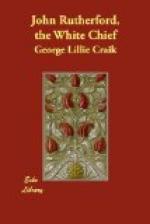Certain superstitions have been connected with the cutting of the hair, from the most ancient times. Many allusions are found in the Greek and Roman writers to the practice of cutting off the hair of the dead, and presenting it as an offering to the infernal gods, in order to secure a free passage to Elysium for the person to whom it belonged. The passage in the fourth book of the “AEneid,” where Iris appears by the command of Juno to liberate the soul of the expiring Queen of Carthage, by thus severing from her head the fatal lock, will occur to many of our readers.
Whatever may have been the origin of this superstition, it is probable that most of the other notions and customs which have prevailed in regard to the cutting of the hair are connected with it. The act in this way naturally became significant of the separation from the living world of the person on whom it was performed. Of the antiquity of this practice, we have a proof in a command given by Moses to the Jews:—“Ye shall not cut yourselves, nor make any baldness between your eyes for the dead.” These were superstitious customs of the nations by whom they were surrounded.
The Gentiles used excessive lamentations, amounting to frenzy, at their funeral rites. According to Bruce, the Abyssinian woman, upon the death of a near relation, cuts the skin of both her temples with the nail of her little finger, which she leaves long on purpose; and thus every fair face throughout the country is disfigured with scars. The same notion of abstraction from the present life and its concerns is expressed by the clerical tonsure, so long known in the Christian church, and still retained among the Roman Catholics. It is still common, also, among ourselves, for widows, in the earlier period of their mourning, to cut off their hair, or to remove it back from the brow. Among all rude nations, besides, the hair has been held in peculiar estimation from its ornamental nature, and its capability of being formed into any shape, according to the fancy of its possessor, or the fashion of the country.
Amongst nations, especially, where the ordinary clothing of the people, from the materials of which it was formed, did not admit of being made very decorative, this consideration would be much regarded, and still more where no clothing was worn at all. In such cases, the hair, either of the head or of the beard, has usually been cherished with very affectionate care, and the mode of dressing it has been made matter of anxious regulation. Many of the barbarous nations of antiquity had each a method of cutting the hair peculiar to itself; and it was sometimes accounted the deepest mark of servitude which a conqueror could impose when he compelled the violation of this sacred rule of national manners.
We have a remnant of these old feelings in the reverence with which his beard is regarded by a Turk of the present day. It is recorded, too, that no reform which Peter the Great of Russia essayed to introduce among his semi-barbaric subjects was so pertinaciously resisted as his attempt to abbreviate their beards.




